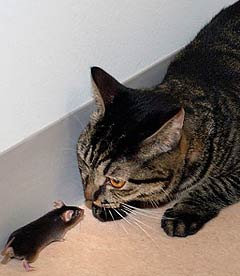The mice are not afraid of cats
Fear seems to be due to the ability to smell, and people can extinguish it simply by " disconnecting " a few sensory areas on the brain, Japanese scientists claim.
In an experiment on mice, the researchers identified and eliminated some receptors on the olfactory bulb. As a result, they have a bunch of fearless mice. To prove this point, the team showed photographs of a tiny mouse compared to a cat, sniffing in his ear, kissing and even playing around the " enemy " necklace.
 (Photo: Telegraph.co.uk) "They detected the smell of an enemy, like a cat, a fox's urine or a snow leopard, but didn't show any fear. The mice even showed their curiosity. Intense, but they cannot know that smell is a dangerous sign, "said Hitoshi Sakano of the University of Tokyo's Department of Physiology and Biochemistry.
(Photo: Telegraph.co.uk) "They detected the smell of an enemy, like a cat, a fox's urine or a snow leopard, but didn't show any fear. The mice even showed their curiosity. Intense, but they cannot know that smell is a dangerous sign, "said Hitoshi Sakano of the University of Tokyo's Department of Physiology and Biochemistry.
"These mice are happy with cats. But before taking photos, we had to feed cats," he recalls.
Experts have long argued that animal fears can be triggered by taste sensitivity . But this is the first time they have discovered that sniffing and the process of decoding it into fear takes place at different points in the olfactory brain region.
Sakano and his colleagues created two lines of mice - one lacking in receptors to decode flavors and the other lacking receptors that detect odors. Both groups are then exposed to the enemy's urine, such as snow leopard and fox.
"The first group still smelled and excitedly played, but didn't feel the danger," Sakano said. In group two, "they are very difficult to detect odors, but as soon as they know it is the fox's urine, they cringe and tend to be dull. That's because they are afraid."
Mice have about 1,000 odor-sensitive genes, while humans have only 400 active genes, and about 800 are inactivated.
Thuan An
- Fearful cats flee the mouse on the street
- Why are mice afraid of cats?
- It turned out not to keep cats as mice
- Rats respond to panic cat regress
- Li explained the phenomenon of cat fear ... cucumber is causing fever
- Why do cats like to quit 'booty' home?
- Rodents are like cats
- The 'strange' cats in the world
- Mice no longer fear cats when infected with parasites
- The mole rats eat the mouse rat manure to get instructions for raising children
- The mouse-cat strange creature made the South African people afraid
- The strange cat loves swimming and catching fish well in Vietnam
 Animal 'suffering' after hibernation
Animal 'suffering' after hibernation Why do goats climb well?
Why do goats climb well? Scientists were surprised to see chimpanzees eating turtles
Scientists were surprised to see chimpanzees eating turtles Giant catfish died deadly due to drought in Thailand
Giant catfish died deadly due to drought in Thailand Surprising discovery: How much to eat to increase longevity the most?
Surprising discovery: How much to eat to increase longevity the most?  Science has found a mechanism to help the brain turn experiences into long-term memories, you can also try it
Science has found a mechanism to help the brain turn experiences into long-term memories, you can also try it  Discovering a therapy to create a 'super-strong' body, increasing life expectancy by 33%
Discovering a therapy to create a 'super-strong' body, increasing life expectancy by 33%  Is it possible to reverse the aging process, dissolving all human diseases in the future?
Is it possible to reverse the aging process, dissolving all human diseases in the future?  Gulls devour rats on the street in a single note
Gulls devour rats on the street in a single note  Why are white mice found all over the world?
Why are white mice found all over the world? 